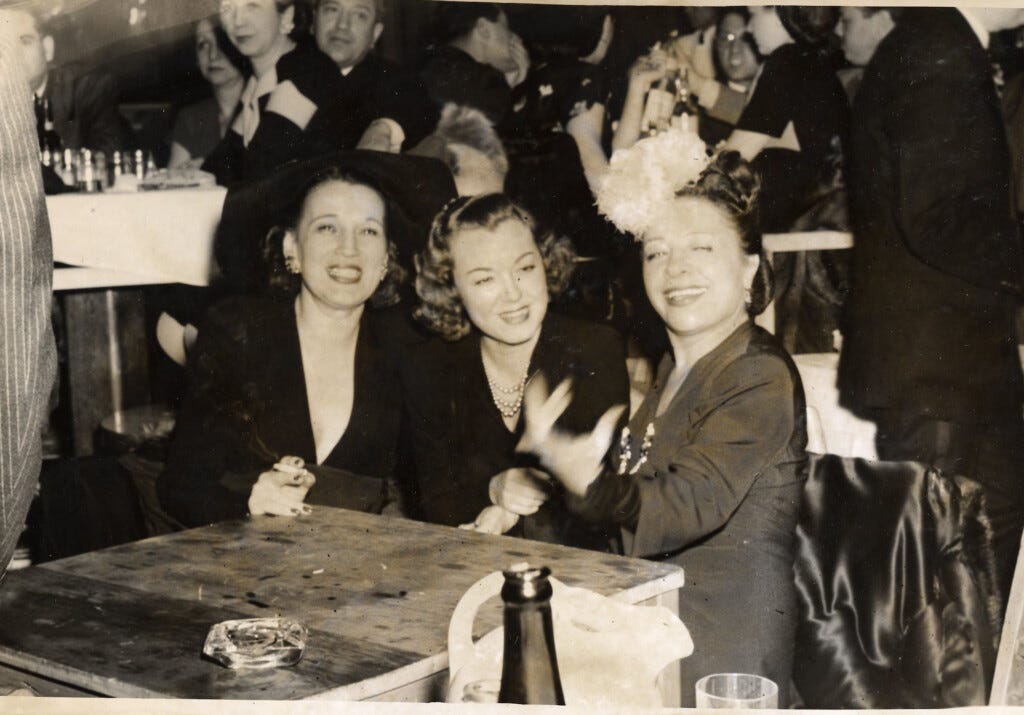Hey everyone,
Welcome to this week’s Too Long; Didn’t Listen. Niko has covered Polly Adler, who we’ve covered pretty extensively on the podcast. In addition to the episode about her, I did an interview with Debby Applegate, who authored her biography Madam, and did a bonus episode on vamps, a look Polly embraced wholeheartedly.
Episode 26: Polly Adler
Listen now (68 mins) | Hey everyone! I’m delighted to bring this next episode to your ears. Polly Adler’s story is a fascinating one of a woman determined to squeeze more out of life than everyone else was willing to allot to her. From abject poverty, she rose to dizzying heights of money and power in New York City and was often at the center of many of New York’s most interes…
If you are a teacher or student using these as a review or notes, please let me know—I love to give discounts to educators and students.
And finally, just a reminder that Adler’s story contains some sexual violence, so it might not be for all readers.
—Valorie
Too Long, Didn’t Listen: Polly Adler
Early Life in Russia:
Polly Alder was born Pearl Adler in 1900 in the Jewish Pale of Russia in a small village called Yanow.
Her father, Moshe, was a tailor who exceptionally visited New York, Berlin, and Warsaw during Adler’s childhood. The two had a very close bond.
Life in Yanow was very strict and heavily regulated. Jews were forbidden to live in most parts of Russia unless they were considered “useful” in some capacity.
Between 1907 and 1910, local Russian governments began expelling thousands of Jews from their homes, driving the dispossessed into a small number of villages like Yanow, raising competition and lowering the standard of living for many.
Emigration to America:
In 1913 Moshe sent Adler to the US. She arrived in Springfield, Massachusetts, where her father had some friends.
She gained the basic education requirement for immigrants and began working in a paper factory, but found the hard work tedious and wasn’t able to save up any money.
Springfield was a great place to become Americanized. The city had one of the best education systems in the country, and girls were allowed to join clubs, play sports, act in plays, and attend concerts, dances, and movies. Adler mixed with other immigrant communities as well.
In May 1915, Adler moved in with a cousin, Breina Freedman, in Brooklyn, New York. They lived in Brownsville, which had a reputation for crime.
Adler worked in a corset factory. The pay was low, but the work was steady and clean thanks to union representation.
Through her new friends at the factory, Adler found a love of dancing and began going out to Coney Island, known as “Sodom of the Sea.”
Patrons went to drink, gamble, watch burlesque shows, get in fights, and more. Waiters often doubled as pimps, and entertainers were openly gay. Women usually used sexual barter to get men to pay for their amusements.
The US entry into World War I encouraged a loosening of morality as sexual barter was now seen as patriotic, especially in Brooklyn. Rates of STIs, illegitimate births, and elopements all rose “precipitously” in 1917.
In one incident, Adler went to Coney Island with a foreman she had a crush on but it ended badly. He locked her in a rickety house, beat her, and raped her. When she realized she was pregnant a few weeks later, she had to scrape together $35 for an abortion (equivalent to $829 today), which was still illegal.
Adler developed a love of finery. She and her friends were “paragons of working-girl fashion, sporting impractically high French heels, daring skirts that showed off the ankles, and girlish empire waistlines that dispensed with the hourglass corsets that made it impossible to dance.” Adler flattened her chest with bindings to keep in fashion.
Introduction to NYC’s Criminal Underbelly:
After the war, Adler moved to Manhattan to find work and a new apartment, first in the Tenderloin and then in the Gashouse District, near Union Square. She briefly found work at another corset factory but between strikes and the lower demand for corsets as they went out of fashion, she had to find other work. It’s probable that this is when she turned to prostitution herself, but it’s unclear.
At the end of 1919, a man named Abe Shornik introduced her to an aspiring singer named Joan, who had an apartment to share on the Upper West Side. Although the neighborhood had a veneer of respectability, it was known as “the district of loose women”.
Through Joan, Adler became friends with several Broadway dancers and singers. She aspired to work on Broadway as it was one of the few places that was equally welcoming to women and Jews as it was to Christian men.
On January 16, 1919, the Eighteenth Amendment passed, prohibiting the production, transport, and sale of liquor, poised to go into effect a year later. Over the course of a year, the 10,343 licensed bars were replaced by more than fifteen thousand speakeasies by February 1920.

Start as a Madam:
Through Joan, she had befriended someone named Tony, a bootlegger who would grow up to be a well-known gangster. At the time, he was having an affair with a married woman, so he told Polly that if she would keep an apartment where he could meet his lady friend whenever he wanted, he would pay the rent.
With Tony’s money, she moved into an apartment on West 115th Street, in a neighborhood called Morningside Heights, feeling a bit like she had finally made it. When Tony’s romance fell apart, he asked Polly to find a new girl for him, so she called up a girl who she knew, quote, “made no bones about…being available for a fee.”
The first time Adler was arrested came just a few months later. Feeling she was at a crossroads, she decided to continue her life as a madam. It was risky, but for the first time, she was able to send money to her family in Yanow and start saving.
Within two years, Adler had saved up six thousand dollars (little over $108,000 today) and opened a lingerie shop with a friend on Broadway.
The two were arrested for the suspicious opening, but the charges were quickly dropped. The lingerie shop failed after two years, but allowed her to show a legitimate business to her father when he moved to the US.
Afterward, Alder began to build up her business as a madam again with capital from Arnold Rothstein and through her network with staff at luxury hotels.
Keep reading with a 7-day free trial
Subscribe to Unruly Figures to keep reading this post and get 7 days of free access to the full post archives.






